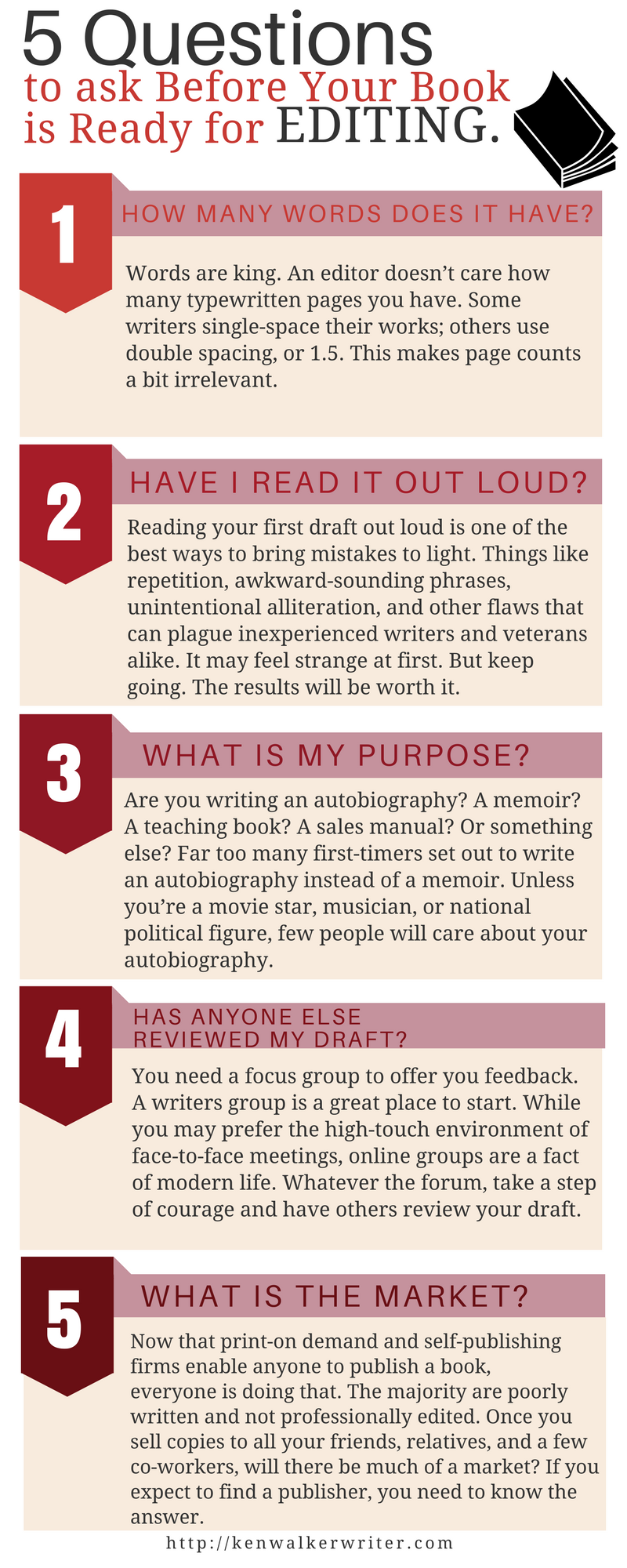5 Ways to Know if Your Book is Ready for Editing

As a member of a professional editors group, I regularly receive inquiries from would-be authors about editing their book for publication. Many aren’t ready for editing, let alone getting their words typeset and between the covers of a book—whether in printed or electronic format.
Too many newcomers think their job is done once they have put forth the effort to get words on paper (or screen). But that’s only the beginning.
Before you search for a professional editor to refine your manuscript, ask yourself five key questions:
1. How many words does it contain?
Words are king. An editor doesn’t care how many typewritten pages you have. Some writers single-space their works; others use double spacing, or 1.5. This makes page counts irrelevant and misleading.
Many new writers are surprised when they learn their 14,000-word collection needs two or three times that content to produce a reasonable-size book.
Commercial publishers will want closer to a minimum of 50,000 to 60,000 words. A 25,000-word book will yield less than 100 pages of typeset copy, which is only acceptable if you’re trying to produce a very short book.
2. Have you read it out loud?
Reading your first draft out loud is one of the best ways to bring mistakes to light. Things like repetition, awkward-sounding phrases, and unintentional alliteration can plague veterans, not just inexperienced writers. They will emerge more clearly in verbal form.
If you are an introvert (a common characteristic of writers and editors) this may not come naturally. It may feel strange, forcing you to set aside self-consciousness and a distinct preference for silent reading. Go ahead and plunge into the deep water. You will be glad you did.
3. What is my purpose?
Are you writing an autobiography? A memoir? A teaching book? A sales manual? Or something else?
Far too many first-timers set out to write an autobiography instead of a memoir. Unless you’re a movie star, musician, or national political figure, few readers will care about your autobiography.
A memoir typically focuses on particular lessons you’ve learned in life and how those experiences can help others in their journey. “Takeaway” value is the key. Don’t start by talking about where you grew up. Relate a catastrophic accident you survived, the civil war you faced in your homeland, or some other dramatic, attention-getting incident.
4. Has anyone else reviewed my draft?
You need a focus group to offer you feedback. A writers group is a great place to start. While you may prefer the high-touch environment of face-to-face meetings, online groups are a fact of modern life.
Having others review a chapter, or part of one, is an exercise in courage. But if you can’t face critiques from other writers who are more likely to be sympathetic to a fellow writer, what makes you think you can handle biting criticism from readers who don’t care about your feelings?
5. What is the market?
Now that print-on demand and self-publishing firms enable anyone to publish a book, everyone is doing that. The problem is the majority are poorly written, a flaw that is evidence of the author’s failure to get their work professionally edited.
What’s more, most self-published books never sell more than 100 copies. Once you sell copies to all your friends, relatives, and a few co-workers, will there be much of a market? If you expect to find a publisher, you need to know the answer.
Now, the market may not matter to you. You may want to write a memoir for extended family members and the great-great-great grandchildren you will never meet, and plan to self-publish it.
But if you are writing a book in hopes of enriching yourself with a best seller, you may be just as well off trying to reach the major leagues. The odds are about the same.




